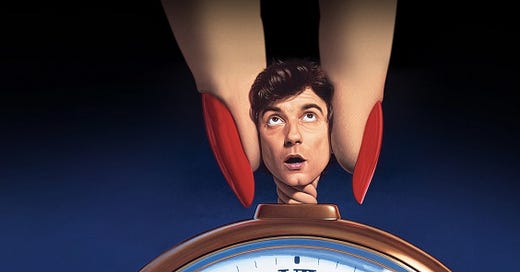Directed by Martin Scorsese
United States, 1985
‘Welcome to Fear City!’ That was a poster greeting one of the ReidsonFilm team as he got out of a cab on the Lower East Side in the early 90s. New York City was a different place then.
Grit, grime, and excitement until a passing car – slows – a horn blows – then the shout “Jungle Fever…!!” at this mixed-race couple. A few years later Mayor Rudy Giuliani (latterly Trump’s legal counsel), arrives with his controversial ‘civic cleanup’ policy to scrub the city clean.
Gentrification stopped dead several doors west of my spot overlooking Avenue B. You could actually see the line. That side of the line; Biafran cuisine, sparkling secure window units, women called Imogen and Saffron, men called Josh and Morgan. My side of the line; crack whores, burned-out cars, bullets stuck in door frames, and men called Father-Eating Bastard. It’s almost a point of honour to live near a crackhouse, like living in a pre-Rudy Zone, a piece of Old New York - Warren Ellis
Pre-Rudy New York is the setting for Martin Scorsese’s After Hours. Ask anyone to list Scorsese’s films and After Hours is likely to make the bottom, if at all. He made it in the mid-80s while struggling to get the money together for The Last Temptation of Christ. Hard to imagine Scorsese having to get out the begging bowl after Mean Streets, Taxi Driver and Raging Bull but that’s showbiz. After Hours is a difficult film to pigeonhole: surreal comedy, urban nightmare, absurdist farce… take your pick.
Paul Hackett (Griffin Dunne) is a yuppie word processor – clerical assistant with a desktop – by day and mostly spends his nights pushing the channel buttons on his cable TV box – no scroll and swipe back then.
One evening he sits in a café in Soho (the Manhattan one) reading Henry Miller’s Tropic of Cancer; remember, Tinder had not been invented in the 80s. Marcy (Rosanna Arquette) bites and after accepting an invitation to her apartment post-midnight we join Hackett on a journey into the Underworld. Chasing the promise of a sexual encounter he is unwittingly headed for a succession of adventures downtown, in the manner of Hercules, Theseus, and of course, Orpheus. We traverse a New York City populated by a motley crew of weirdos and misfits as Hackett witnesses a suicide, an S&M session, a murder, and a series of burglaries, before being chased by a mob with an ice-cream van who think he’s the thief. So it’s not a romantic comedy. There is no romance and the comedy? Well, we had mixed views about that.
What is undeniable is that Scorsese shuffles and plays his cinematic deck of cards to full effect. He uses a series of Hitchcockian McGuffins - a $20 bill, a bagel made of plaster, a skull keyring – to loop back and forth across the narrative (North by Northwest anyone?). Careening tracking shots and offbeat ellipses spill across the screen. Scorsese’s cinematographer, Michael Ballhaus, who went on to deliver that tracking shot in Goodfellas, pulls off an audacious trick filming a bunch of keys dropped from an apartment. The camera watches the keys falling, and then takes the keys’ point of view to look at Hackett, before we see them fall from his perspective. They hit the ground and the camera zooms in.
Thelma Schoonmaker’s editing is vital here, but she also gives the film a frenetic, busy energy. Prefiguring the status anxiety of the Safdie brothers’ Uncut Gems, After Hours is not a film for those in need of relaxation. Howard Shore’s garish soundtrack (no trace of that in The Lord of the Rings or The Hobbit) doesn’t help.
Where does that anxiety come from? Hackett spends the night escaping not only from Marcy (Arquette’s screen time is disappointingly short), but in succession Julie (Teri Garr), Kiki (Linda Fiorentino), Gail (Catherine O’Hara) and June (Verna Bloom), a line of women by turns weird, neurotic, flirtatious and eventually threatening. What we have here is a male paranoid fantasy. And just to hammer the point home Gail circles her bed with rat-traps and when Hackett ventures into a nightclub toilet there is graffiti on the wall: a shark biting a man’s erect penis.
Scorsese says that Hackett’s odyssey reflects the challenges he faced trying to get Last Temptation made – no mention of a castration complex there. He does however, succeed in landing the film’s ending back where it began and ReidsonFilm were entertained… to varying degrees.
At least he managed to keep this one under 2 hours … unlike The Godfather 2049 (The Irishman) – C
Reids’ Results (out of 100)
C - 65
T - 70
N - 71
S - 69
Intertextuality Incident of the Week:
A cop marches Hackett out of the subway as he has no money for a ticket. Off camera he says, "There must be a full moon tonight". Griffin Dunne had starred in An American Werewolf in London four years earlier.
Thank you for reading Reids on Film. If you enjoyed it please share with a friend and do leave a comment.




